Key takeaways:
- STEM internships provide practical experience, enhance teamwork and problem-solving skills, and create valuable networking opportunities.
- Internships bridge the gap between academic knowledge and real-world application, offering exposure to industry standards and fostering a sense of community within STEM fields.
- Effective application strategies include tailoring resumes, networking, and practicing for interviews to highlight relevant skills and increase chances of success.
- A compelling cover letter should reflect genuine enthusiasm, be personalized to the organization, and include a strong call to action to leave a lasting impression.
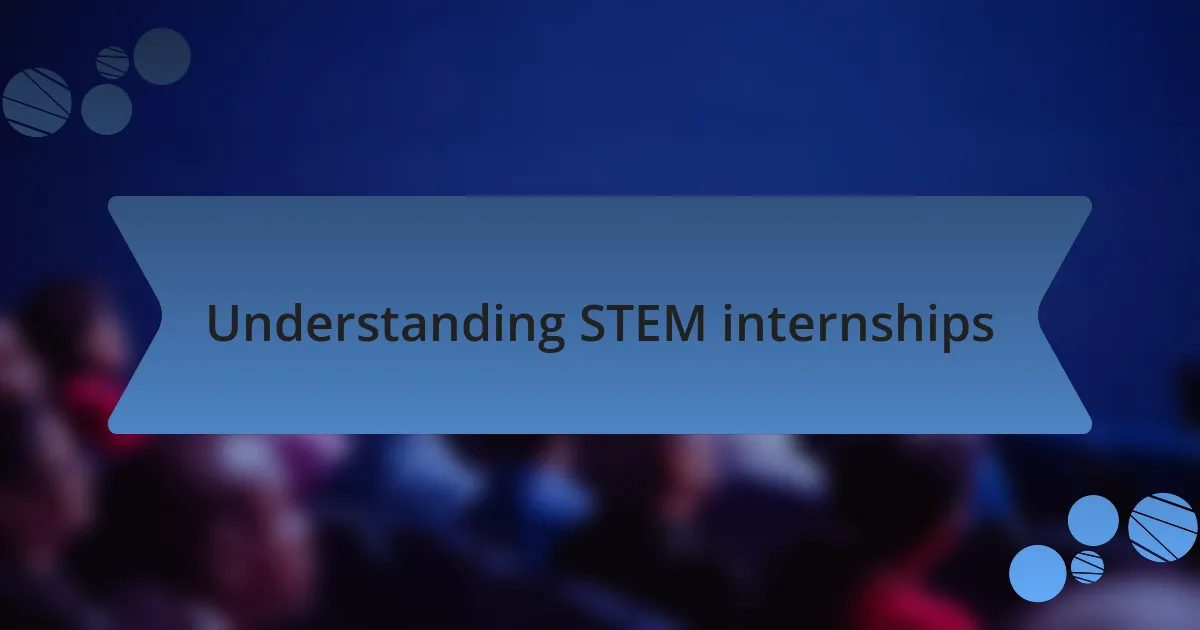
Understanding STEM internships
STEM internships are gateways to practical experience in fields like science, technology, engineering, and mathematics. I remember my first internship; I was both excited and anxious about leaving the classroom and diving into real-world projects. It’s a pivotal time where theoretical knowledge meets hands-on application, allowing students to test their skills and identify areas for growth.
What really surprised me about my internship was how much I learned about teamwork and problem-solving in a professional environment. Have you ever been part of a team project that felt overwhelming? In an internship, you’re often asked to collaborate on complex tasks, and I found that those challenges helped me grow more than I could have imagined. It’s in these moments that you start to understand the importance of effective communication and adaptability in STEM careers.
Moreover, STEM internships often provide invaluable networking opportunities. I still keep in touch with mentors I met during that time who have played crucial roles in my career journey. Isn’t it interesting how a single internship can shape your professional connections and future opportunities? Engaging actively during your internship can create relationships that last well beyond the final day.
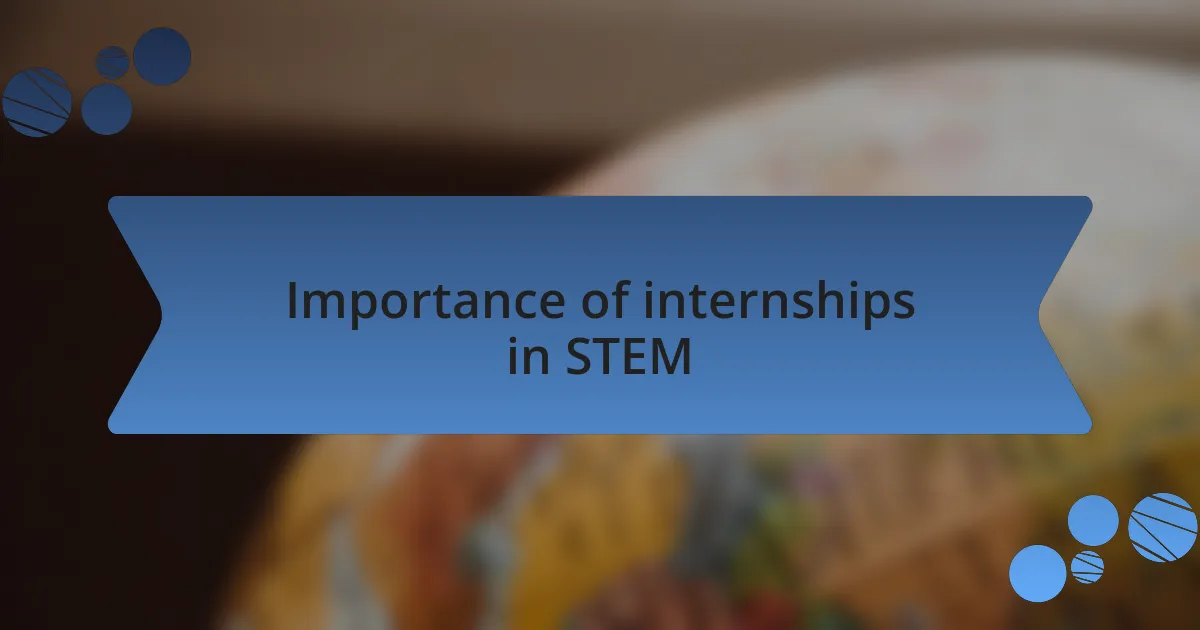
Importance of internships in STEM
Internships in STEM are essential for bridging the gap between academic learning and real-world application. I recall attending a seminar during my internship where a guest speaker shared their journey from a lab assistant to a lead researcher. That moment really hit home for me; it illustrated how essential these experiences are in shaping one’s career trajectory. Have you ever had a lightbulb moment that changed your perspective? Internships can provide that spark, revealing the depth and nuances of a profession.
Another vital aspect of STEM internships is the exposure to industry standards and practices. While working on a coding project, I discovered tools and software that were not part of my coursework. This hands-on exposure ultimately made me more marketable and confident in my abilities. Isn’t it amazing how experience can open doors you didn’t even know existed? By immersing ourselves in these environments, we gain insights that often surpass what textbooks can teach.
Lastly, internships can cultivate a sense of belonging within the STEM community. I remember attending a networking event where I connected with like-minded peers and experienced professionals, sharing not just our challenges but also our aspirations. This sense of unity is uplifting, as it reinforces the idea that you are part of something larger. Have you ever felt inspired by your network? Those connections can offer encouragement and guidance throughout your career journey, inspiring you to pursue your passions relentlessly.
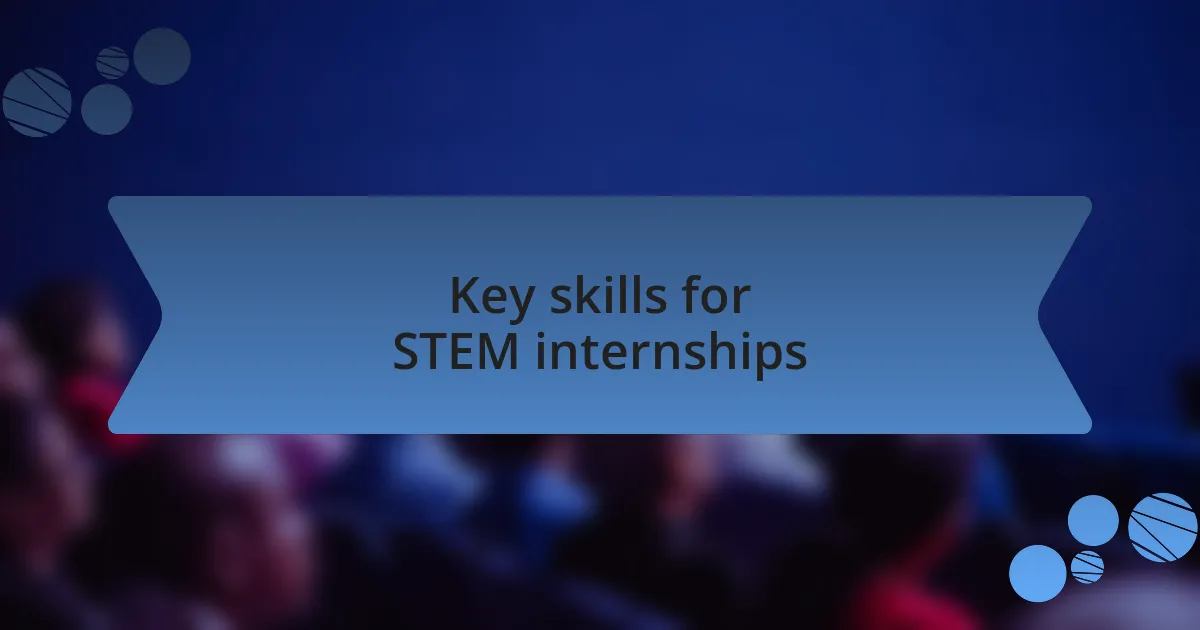
Key skills for STEM internships
When pursuing a STEM internship, problem-solving skills are indispensable. I vividly remember a group project where my team faced a significant hurdle in our experiment’s design. It was the process of brainstorming solutions under pressure that truly honed my ability to think critically and approach challenges from various angles. Have you ever found yourself in a tight spot where your creativity saved the day? Those moments not only build resilience but also prepare you for similar scenarios in future roles.
In addition to problem-solving, effective communication stands out as a crucial skill. During my internship, I had to present complex data to a non-technical audience, and it was a challenge to find the right balance between clarity and detail. This experience taught me that conveying information in an accessible way is essential, pushing me to refine my messaging. How often do we overlook the importance of sharing our insights clearly? Strong communication fosters collaboration and enhances teamwork, which are vital in any STEM setting.
Finally, a solid foundation in technical skills specific to your field is fundamental. For instance, while working in a robotics lab, I quickly realized the importance of mastering programming languages and understanding the mechanics of our projects. The more I invested in these technical skills, the more confidence I gained in my contributions. Have you noticed how expertise in certain tools opens up exciting opportunities? Emphasizing these skills can set you apart in a competitive internship landscape and demonstrate your readiness to tackle real-world challenges.
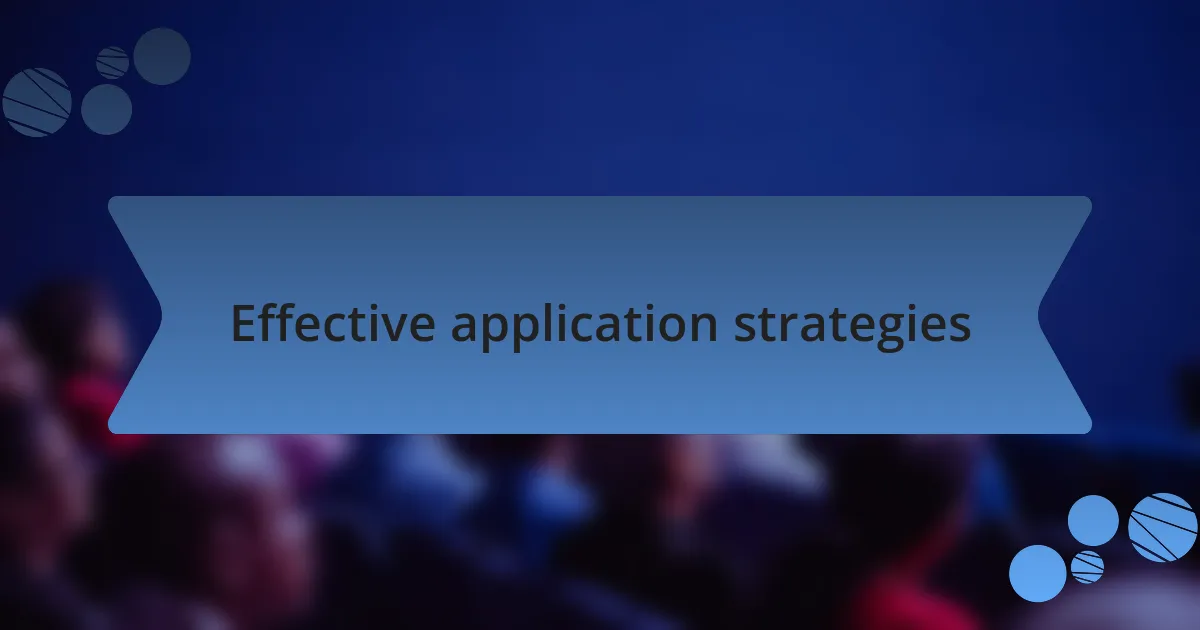
Effective application strategies
When it comes to applying for STEM internships, tailoring your application materials is key. I remember vividly when I customized my resume for a position that focused heavily on environmental engineering. Instead of using a generic format, I highlighted relevant coursework and projects, showcasing my enthusiasm for the field. Have you ever noticed how a little personalization can really grab an employer’s attention? It shows that you’ve invested time into understanding the company and the role, making your application much more compelling.
Networking plays an equally significant role in the application process. During my own journey, I attended a couple of career fairs where I made connections with industry professionals. Those casual conversations often led to insider tips on what employers are looking for in candidates. It made me realize that sometimes, knowing the right person can be just as important as having the right qualifications. Have you considered how powerful your own network is? Relationships can serve as gateways to opportunities that aren’t always advertised.
Lastly, practice is essential when it comes to interviews. I distinctly recall preparing for a technical interview by simulating questions with peers and working through coding challenges together. This not only eased my nerves but also helped me articulate my thought process more clearly. How often do we underestimate the importance of preparation? Walkthroughs like these signal your ability to think critically under pressure, which is something companies admire. Being well-prepared can genuinely enhance your confidence and performance during the actual interview.
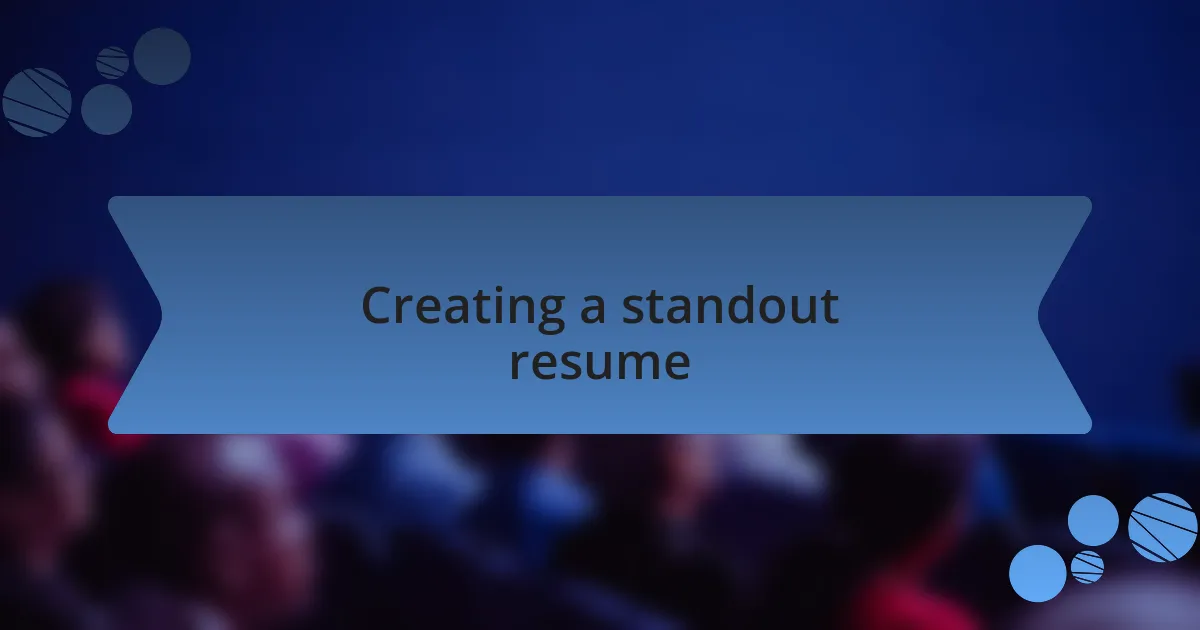
Creating a standout resume
When creating a standout resume, the first step is to ensure that your format and layout are visually appealing and easy to read. I once struggled with this myself; my initial resume was cluttered and unorganized, which did not reflect my skills well. Have you ever felt frustrated staring at a wall of text? A clean design, with clear headers and bullet points, not only draws attention but also allows important information to shine through.
Additionally, highlighting specific accomplishments can set your resume apart from the rest. I remember quantifying my achievements during a summer research project by stating how I increased efficiency by 20%. This concrete detail made it much more impactful. Have you thought about how numbers can add credibility to your claims? Sharing tangible results helps potential employers envision what you can bring to their team.
Lastly, don’t underestimate the power of a strong summary statement at the top of your resume. This is your personal brand encapsulated in a few sentences. I learned the hard way that a bland summary doesn’t do you justice; when I revised mine to emphasize my passion for innovation in technology, it immediately resonated more. Have you reviewed your summary lately? Crafting a statement that connects your experiences to the role you’re applying for can make a lasting impression.

Crafting a compelling cover letter
When crafting a compelling cover letter, it’s essential to reflect your genuine enthusiasm for the position. I recall a time when I poured my heart into a cover letter for a research internship; I conveyed not just my qualifications, but my excitement about contributing to innovative projects. Have you ever noticed how passion can leap off the page? That energy can set your application apart from others.
Tailoring your cover letter to the specific organization is crucial. I used to send generic letters, thinking they would suffice, but soon realized that taking the time to address the company’s mission and values resonated far better with recruiters. Have you thought about how much personalization can show your dedication? When you connect your skills to the company’s goals, it creates a narrative that hiring managers can relate to.
Finally, closing your cover letter with a strong call to action can leave a lasting impression. I once ended a letter by stating how eager I was to discuss my ideas in a conversation, which resulted in a prompt interview invitation. How do you want the reader to feel after finishing your letter? A confident, forward-looking conclusion can highlight your commitment and eagerness to become part of their team.
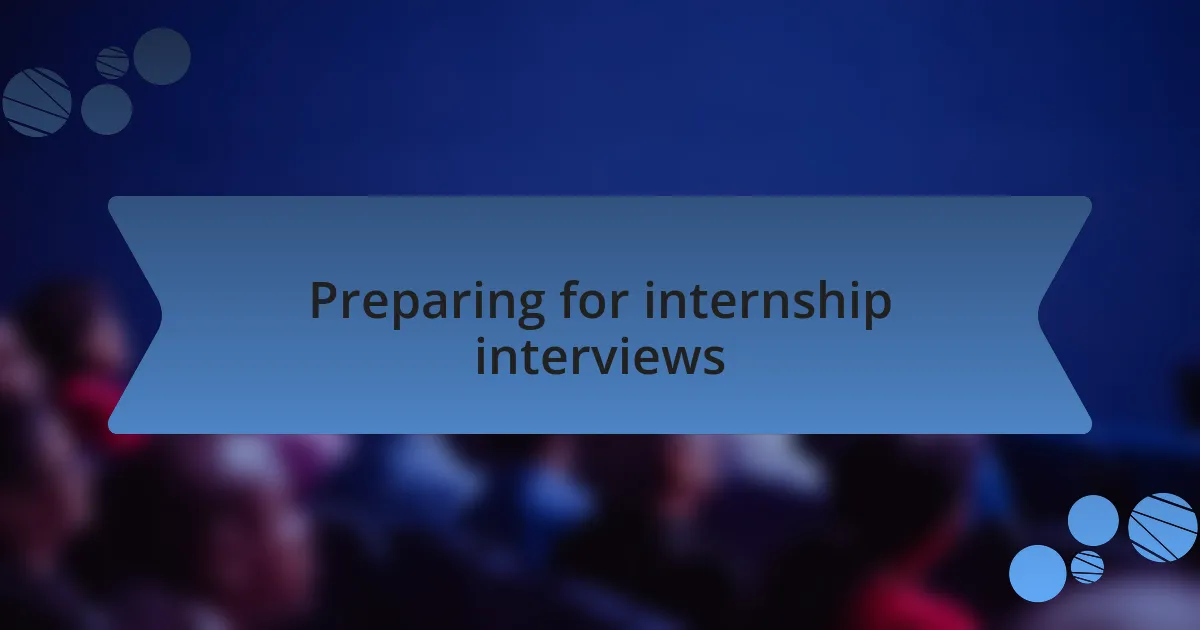
Preparing for internship interviews
Preparing for internship interviews is as much about self-reflection as it is about practice. I remember preparing for an engineering internship where I wrote down potential questions, but more importantly, I reflected on my experiences and how they shaped my interest in the field. It’s incredible how articulating your journey not only boosts your confidence but also provides clear, memorable responses during the interview.
Researching the company beforehand is a game-changer. I once spent hours learning about a tech company that was innovative in sustainable design, and when they asked about my views on their latest project, I felt ready and engaged. Have you ever thought about how being informed can lead to more meaningful conversations? It showed them not just my technical skills, but also my alignment with their values.
Finally, practicing your interview skills with a friend can ease anxiety. The first mock interview I did was nerve-wracking, but it helped me refine my responses and body language. Have you noticed how feedback can enhance your performance? Identifying areas for improvement in a supportive setting can transform your confidence when it’s time for the real thing.